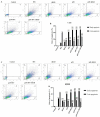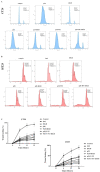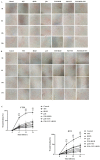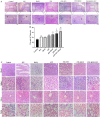Anticancer activity of Pseudomonas aeruginosa derived peptide with iRGD in colon cancer therapy
- PMID: 37396945
- PMCID: PMC10311979
- DOI: 10.22038/IJBMS.2023.68331.14913
Anticancer activity of Pseudomonas aeruginosa derived peptide with iRGD in colon cancer therapy
Erratum in
-
Corrigendum: Anticancer activity of Pseudomonas aeruginosa derived peptide with iRGD in colon cancer therapy.Iran J Basic Med Sci. 2025;28(7):962. doi: 10.22038/ijbms.2025.25959. Iran J Basic Med Sci. 2025. PMID: 40703762 Free PMC article.
Abstract
Objectives: Colon cancer is well-known as a life-threatening disease. Since the current treatment modalities for this type of cancer are powerful yet face some limitations, finding novel treatments is required to achieve better outcomes with fewer side effects. Here we investigated the therapeutic potential of Azurin-p28 alone or along with iRGD (Ac-CRGDKGPDC-amide) as a tumor-penetrating peptide and 5-fluorouracil (5-FU) for colon cancer.
Materials and methods: Inhibitory effect of p28 with or without iRGD/5-FU was studied in CT26 and HT29, as well as the xenograft animal model of cancer. The effect of p28 alone or along with iRGD/5-FU on cell migration, apoptotic activity, and cell cycle of the cell lines was assessed. Level of the BAX and BCL2 genes, tumor suppressor genes [(p53 and collagen type-Iα1 (COL1A1), collagen type-Iα2 (COL1A2)] were assessed by quantitative RT-PCR.
Results: These findings show that using p28 with or without iRGD and 5-FU raised the level of p53 and BAX but decreased BCL2, compared with control and 5-FU groups in tissues of the tumor, which result in raising the apoptosis.
Conclusion: It seems that p28 may be used as a new therapeutic approach in colon cancer therapy that can enhance the anti-tumor effect of 5-FU.
Keywords: Azurin-p28; Bacterial peptide; Colon cancer; Irgd; Pseudomonas aeruginosa.
Conflict of interest statement
The authors have declared that have no conflicts of interest
Figures









Similar articles
-
Anticancer activity of Helicobacter pylori ribosomal protein (HPRP) with iRGD in treatment of colon cancer.J Cancer Res Clin Oncol. 2021 Oct;147(10):2851-2865. doi: 10.1007/s00432-021-03683-7. Epub 2021 Jun 12. J Cancer Res Clin Oncol. 2021. PMID: 34117917 Free PMC article.
-
The Black Book of Psychotropic Dosing and Monitoring.Psychopharmacol Bull. 2024 Jul 8;54(3):8-59. Psychopharmacol Bull. 2024. PMID: 38993656 Free PMC article. Review.
-
A rapid and systematic review of the clinical effectiveness and cost-effectiveness of paclitaxel, docetaxel, gemcitabine and vinorelbine in non-small-cell lung cancer.Health Technol Assess. 2001;5(32):1-195. doi: 10.3310/hta5320. Health Technol Assess. 2001. PMID: 12065068
-
Cost-effectiveness of using prognostic information to select women with breast cancer for adjuvant systemic therapy.Health Technol Assess. 2006 Sep;10(34):iii-iv, ix-xi, 1-204. doi: 10.3310/hta10340. Health Technol Assess. 2006. PMID: 16959170
-
Chemotherapy for advanced gastric cancer.Cochrane Database Syst Rev. 2017 Aug 29;8(8):CD004064. doi: 10.1002/14651858.CD004064.pub4. Cochrane Database Syst Rev. 2017. PMID: 28850174 Free PMC article.
Cited by
-
The Production of Recombinant Azurin from Pseudomonas aeruginosa and Its Ability to Induce Apoptosis in Various Breast Cancer Cell Lines.Int J Mol Sci. 2025 Jun 27;26(13):6188. doi: 10.3390/ijms26136188. Int J Mol Sci. 2025. PMID: 40649966 Free PMC article.
-
Cancer-Targeting Applications of Cell-Penetrating Peptides.Int J Mol Sci. 2024 Dec 24;26(1):2. doi: 10.3390/ijms26010002. Int J Mol Sci. 2024. PMID: 39795861 Free PMC article. Review.
-
Exploring the Chemical Features and Biomedical Relevance of Cell-Penetrating Peptides.Int J Mol Sci. 2024 Dec 25;26(1):59. doi: 10.3390/ijms26010059. Int J Mol Sci. 2024. PMID: 39795918 Free PMC article. Review.
References
-
- Siegel RL, Miller KD, Wagle NS, Jemal A. Cancer statistics, 2023. Cancer J Clin. 2023;73:17–48. - PubMed
-
- Cao C, Yan TD, Black D, Morris DL. A systematic review and meta-analysis of cytoreductive surgery with perioperative intraperitoneal chemotherapy for peritoneal carcinomatosis of colorectal origin. Ann Surg Oncol. 2009;16:2152–2165. - PubMed
-
- Portilla AG, Cendoya I, De Tejada IL, Olabarria I, de Lecea CM, Magrach L, et al. Peritoneal carcinomatosis of colorectal origin Current treatment. Review and update. Rev Esp Enferm Dig. 2005;97:716–737. - PubMed
LinkOut - more resources
Full Text Sources
Research Materials
Miscellaneous
